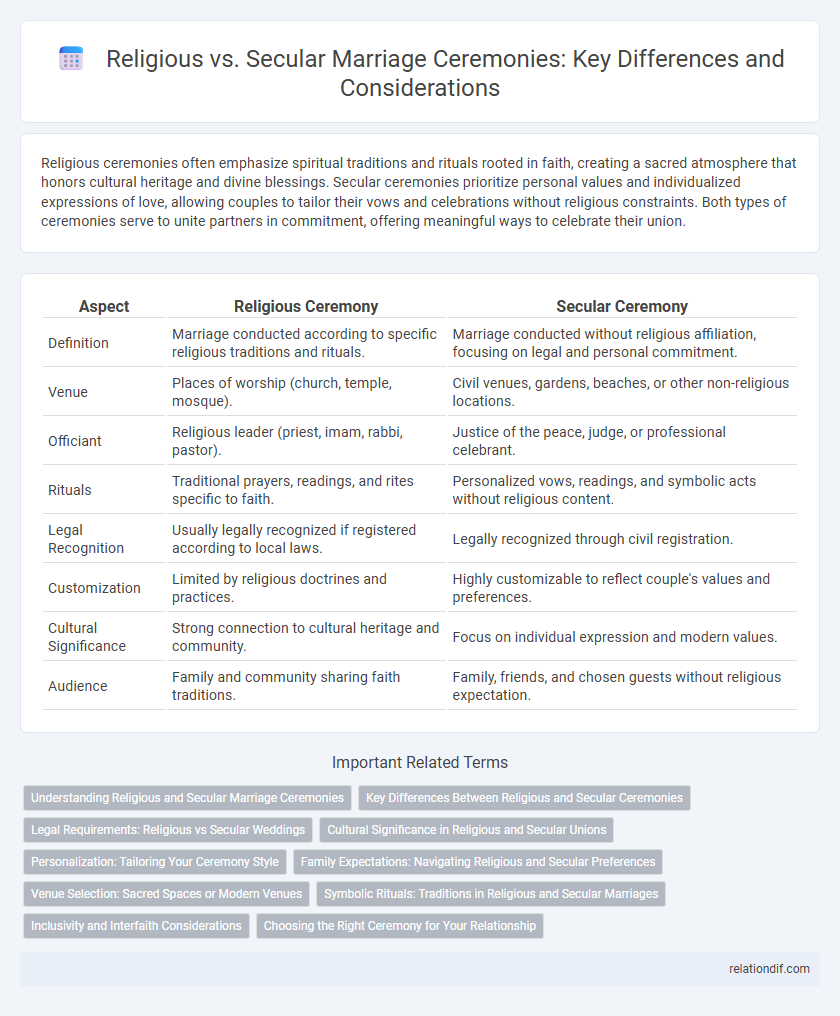Religious ceremonies often emphasize spiritual traditions and rituals rooted in faith, creating a sacred atmosphere that honors cultural heritage and divine blessings. Secular ceremonies prioritize personal values and individualized expressions of love, allowing couples to tailor their vows and celebrations without religious constraints. Both types of ceremonies serve to unite partners in commitment, offering meaningful ways to celebrate their union.
Table of Comparison
| Aspect | Religious Ceremony | Secular Ceremony |
|---|---|---|
| Definition | Marriage conducted according to specific religious traditions and rituals. | Marriage conducted without religious affiliation, focusing on legal and personal commitment. |
| Venue | Places of worship (church, temple, mosque). | Civil venues, gardens, beaches, or other non-religious locations. |
| Officiant | Religious leader (priest, imam, rabbi, pastor). | Justice of the peace, judge, or professional celebrant. |
| Rituals | Traditional prayers, readings, and rites specific to faith. | Personalized vows, readings, and symbolic acts without religious content. |
| Legal Recognition | Usually legally recognized if registered according to local laws. | Legally recognized through civil registration. |
| Customization | Limited by religious doctrines and practices. | Highly customizable to reflect couple's values and preferences. |
| Cultural Significance | Strong connection to cultural heritage and community. | Focus on individual expression and modern values. |
| Audience | Family and community sharing faith traditions. | Family, friends, and chosen guests without religious expectation. |
Understanding Religious and Secular Marriage Ceremonies
Religious marriage ceremonies often incorporate rituals, prayers, and traditions specific to a particular faith, emphasizing spiritual commitment and communal blessings. Secular ceremonies focus on legal and personal vows without religious elements, allowing for customization to reflect individual values and beliefs. Understanding these distinctions helps couples choose a ceremony that aligns with their cultural background and personal preferences.
Key Differences Between Religious and Secular Ceremonies
Religious ceremonies typically follow established rituals and doctrines specific to a faith, often held in places of worship and officiated by clergy, emphasizing spiritual vows and traditions. Secular ceremonies, in contrast, focus on personalized, non-religious expressions of commitment, usually conducted by a civil official or celebrant in diverse venues, highlighting legal and social aspects of marriage. Key differences also include the role of symbolic elements, legal recognition, and the presence or absence of religious texts and prayers.
Legal Requirements: Religious vs Secular Weddings
Religious ceremonies often require adherence to specific rituals and recognition by religious authorities, which may be necessary for the marriage to be legally valid within certain jurisdictions. Secular ceremonies typically focus on fulfilling civil legal requirements such as obtaining a marriage license and having authorized officiants perform the marriage to ensure legality. Legal recognition of both religious and secular weddings varies by country and region, with some requiring additional documentation or registration with civil authorities.
Cultural Significance in Religious and Secular Unions
Religious ceremonies often hold profound cultural significance, embodying sacred traditions and spiritual values that connect couples to their faith and community heritage. Secular ceremonies emphasize personal expression and inclusivity, reflecting contemporary societal values and allowing for diverse cultural interpretations without religious constraints. Both forms of unions offer meaningful rituals that honor cultural identity and foster communal bonds through shared experiences.
Personalization: Tailoring Your Ceremony Style
Personalizing a marriage ceremony allows couples to reflect their unique values and identities, whether through religious traditions or secular elements. Religious ceremonies often follow established rituals that can be customized with personalized vows or symbolic gestures to deepen spiritual meaning. Secular ceremonies offer greater flexibility in structure and content, enabling couples to incorporate creative themes, readings, and music that resonate with their personal love story.
Family Expectations: Navigating Religious and Secular Preferences
Family expectations often play a crucial role in choosing between a religious ceremony and a secular ceremony, reflecting deeply rooted cultural and spiritual values. Religious ceremonies typically honor traditions and rituals that many family members expect, fostering a sense of unity and shared heritage. Secular ceremonies may accommodate diverse beliefs and modern preferences, prioritizing personal expressions of commitment and inclusivity within the family dynamic.
Venue Selection: Sacred Spaces or Modern Venues
Sacred spaces such as churches, temples, and mosques offer a spiritual ambiance that enhances the sanctity of religious marriage ceremonies. Modern venues provide flexibility in design and amenities, catering to personalized secular weddings with diverse cultural influences. Couples must consider venue capacity, aesthetic preferences, and ritual requirements to align the location with their ceremonial vision.
Symbolic Rituals: Traditions in Religious and Secular Marriages
Symbolic rituals in religious ceremonies often involve sacraments, blessings, and sacred vows that reflect spiritual beliefs and cultural heritage. In contrast, secular ceremonies emphasize personalized rituals such as exchanging rings, lighting unity candles, or incorporating meaningful readings that highlight the couple's values and relationship. Both types of marriages use symbolic acts to create memorable experiences, celebrate commitment, and honor traditions unique to their context.
Inclusivity and Interfaith Considerations
Religious ceremonies often reflect specific doctrinal traditions and may present challenges for interfaith couples seeking inclusivity. Secular ceremonies provide a flexible framework, accommodating diverse beliefs and cultural practices without adhering to rigid religious protocols. Choosing a wedding format that honors both partners' backgrounds fosters mutual respect and meaningful participation for all attendees.
Choosing the Right Ceremony for Your Relationship
Choosing between a religious ceremony and a secular ceremony depends on the couple's beliefs, values, and the significance they place on tradition. Religious ceremonies often involve specific rituals and spiritual elements aligned with faith, providing a sacred experience. Secular ceremonies offer personalized vows and inclusive settings, ideal for couples valuing flexibility and cultural diversity without religious affiliation.
Religious Ceremony vs Secular Ceremony Infographic

 relationdif.com
relationdif.com